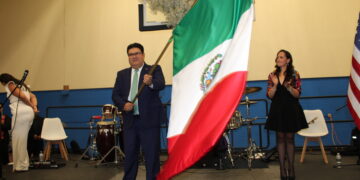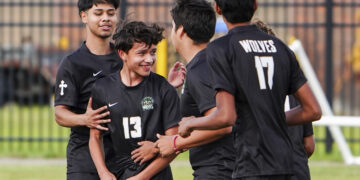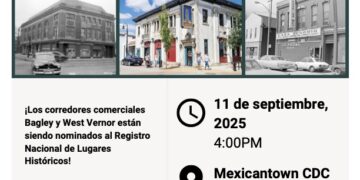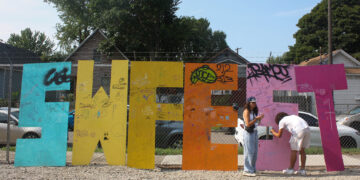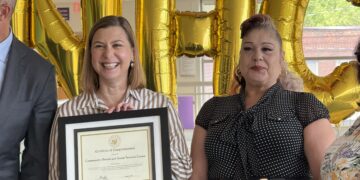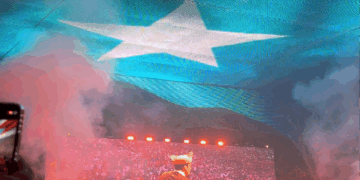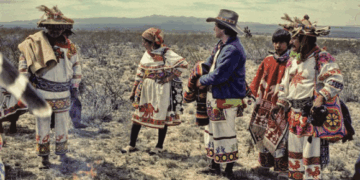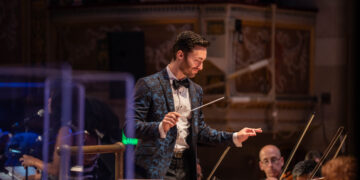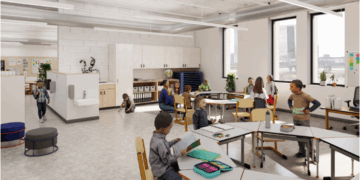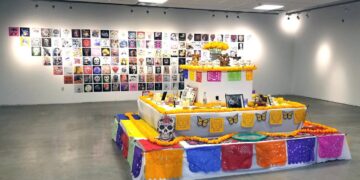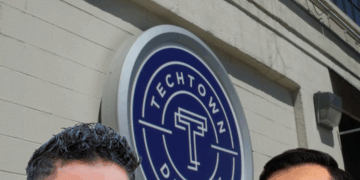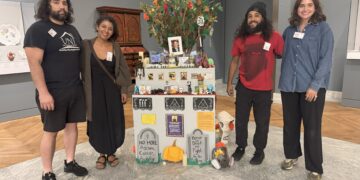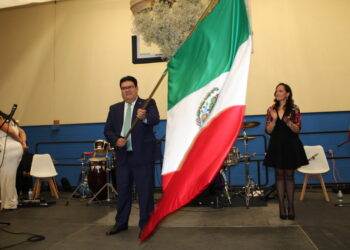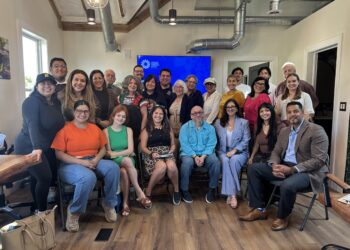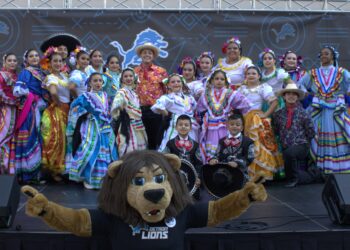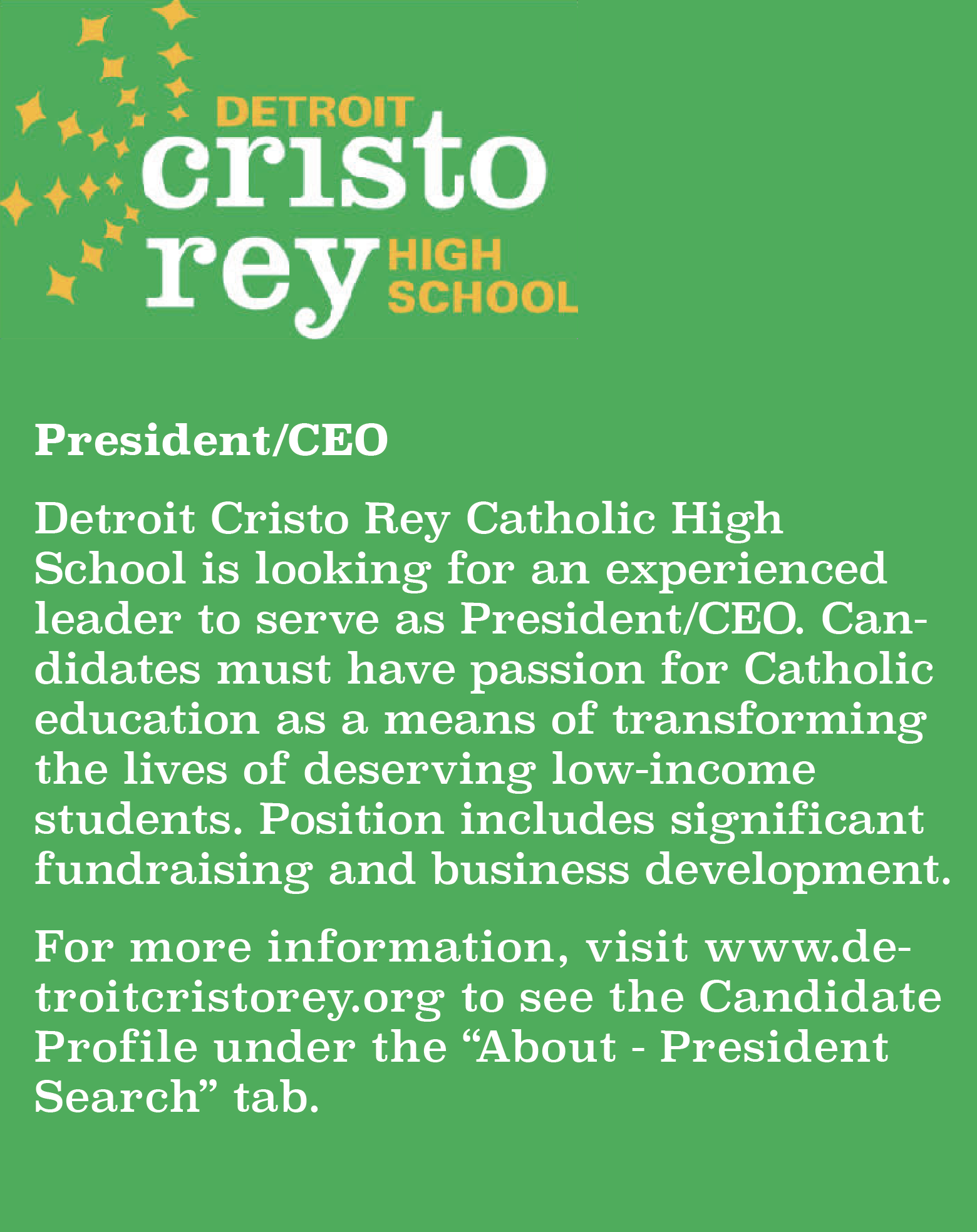In a memorable moment for Southwest Detroit, students from César Chávez Academy’s robotics team stood shoulder to shoulder with some of the world’s greatest robotics teams during the 2025 FIRST Robotics World Championship in Houston, Texas.
The organizers of the championship, FIRST (For Inspiration and Recognition of Science and Technology), host over 2,000 competitions each year. The FIRST World Championship is the most prestigious of them all. To get there, teams must train rigorously and succeed at district, regional, and state-level competitions. The top-performing teams then earn the chance to compete with more than 600 teams from 58 countries.
At the World Championship, CCA’s team—the AzTech Eagles 4680—competed in the Galileo Division, one of eight divisions that function as mini-competitions. Within that division, they played 10 qualification matches and won four, ultimately placing 49th out of 75 teams in their field. While they didn’t move on to the final “Einstein” playoffs, which require being chosen by a top-performing alliance, their presence still marked a huge success.
Their achievement was no small feat. The team devoted countless hours—over months and even years—to earn their spot at the world championship. Julissa, a senior and mechanical coach, explained that they implemented key mechanisms to perform different tasks, such as climbers to lift algae balls, intakers to grab items from the field, a sophisticated drive system, and programmed Xbox controllers to operate their robot.
However, they believe it wasn’t just the robot’s capabilities that got them there, but the resilience and commitment that define their team. “We don’t give up easily… even if we don’t have a lot of money, we use what we have to make (the robot) a little better,” said Ashley, a sophomore and marketing lead on the team.
Ashley also thanked the Southwest Detroit robotics teams who share a workspace with them at the Detroit Hispanic Development Center. “We all just work together as a community—a family, really. If someone’s missing something, we loan it. If we’re missing something, they loan it to us. We help each other out.”
They also credit their student-led approach as something that makes them stand out and enhances member growth. Elizabeth Fox, the team’s lead mentor, explained, “We’re a very student-led team. We let the kids do everything they possibly can. (For example,) we have a student drive coach—that’s really rare. On the field, it’s the students making the calls. Even when adults get asked what to do, they step back and say, ‘It’s not my call—it’s theirs.’… That level of trust makes us different.”
For seniors like Diego, attending the World Championship was especially meaningful. A member since freshman year, he’s been part of the build team, served as a team representative, and worked as a scout. “I feel really excited and proud,” he said. “Seeing all the work our team has put in during the season finally pay off means a lot—especially after four years of being here.”
He added, “I feel honored to have my team represent not only our school but all of Southwest Detroit on the world stage.” Representing his city and culture made the experience even more personal.
Danny, also a senior and part of the build team, said the entire experience felt surreal. “I felt hyped,” he said. “To be able to travel across states, be in Texas, and experience one of the biggest STEM events—it’s just amazing. And for it to happen during my senior year makes it even better.”
Danny also mentored newer members this season, introducing them to the world of robotics and tools like the MOSCOW method, a project planning technique that helps teams prioritize tasks by sorting them into four categories: Must have, Should have, Could have, and Won’t have.
The experience also gave students important life skills, such as how to communicate with confidence and strategize under pressure. “I learned how to present myself and my team to judges,” said Diego. “I practiced answering their questions and learned how to scout other teams”—a process in which students evaluate other teams’ performances to identify strong potential partners for alliances. “That helped us choose strong alliances during matches. It’s taught me a lot about strategy and communication.”
Blaine, one of the team’s photographers and media leads, echoed that. “Thanks to FIRST and this season’s events, I’ve learned about all the opportunities out there. I learned not to give up and to go for the long shots.”
Ashley shared a similar sentiment: “Worlds opened a lot of doors for me. Just seeing how other teams build, how they think, how they strategize—I learned so much just by asking questions and watching how they work.”
Still, the learning didn’t stop there. The team also attended dozens of workshops and speaker events. “There were hundreds of conferences, and our 33 members attended over 34 different ones,” explained Elizabeth Fox. The conferences taught students how to network, apply new building strategies, and use the FIRST alumni network.
Participating in robotics has helped students improve significantly beyond just technical skills, so much so that people outside their team are applauding them. Linette Garza, the Assistant Principal at Caesar Chavez Academy, explains how robotics encourages the development of soft skills. “I’ve seen them grow in their ability to communicate, work in teams, and show resilience,” she said. “Robotics isn’t just about building robots; it’s about building self-confidence and learning how to overcome failure. That’s a key skill that can be applied to so many areas in life.”
But beyond personal development, trophies and rankings, the AzTech Eagles understand the larger importance of STEM programs in their community. “I think it’s important to introduce STEM programs like robotics to Southwest Detroit,” Danny said. “This area is home to many Latinos, and programs like this help promote Latino representation in STEM. It also encourages students to stay engaged and focused on their education—especially here in a city known for its automotive industry.”
Diego agreed. “FIRST helps inspire kids across all ages. It helps create the next generation of engineers who can represent our community, no matter where they go.”
As the team returned home from Houston, they brought unforgettable memories, new skills, and an enhanced sense of purpose. “Being part of Team 4680 has been one of the most important experiences of my life,” Diego said. “And getting to share it with my teammates, and with our whole community watching—it’s something I’ll never forget.”
Their achievement highlights how, with hard work and community support, students from Southwest Detroit can achieve incredible things on a global level.
Kaylee Razo is a high school senior at Detroit Cristo Rey High School and a passionate advocate. She is the co-chair of Strangers No Longer’s Youth Council (Youth in Action for Immigration) and a mentor at the Michigan Youth Civil Rights Academy.
EL CENTRAL Hispanic News is partially funded by Press Forward, the national movement to strengthen communities by reinvigorating local news. Learn more at www.pressforward.news.
El Equipo de Robótica de la Academia César Chávez representa al suroeste de Detroit en el Campeonato Mundial de Robótica
En un momento memorable para el suroeste de Detroit, los estudiantes del equipo de robótica de la Academia César Chávez se enfrentaron a algunos de los mejores equipos de robótica del mundo durante el Campeonato Mundial de Robótica FIRST 2025 en Houston, Texas.
Los organizadores del campeonato, FIRST (Por la Inspiración y el Reconocimiento de la Ciencia y la Tecnología), organizan más de 2000 competencias cada año. El Campeonato Mundial FIRST es el más prestigioso de todos. Para llegar allí, los equipos deben entrenar rigurosamente y tener éxito en competencias a nivel distrital, regional y estatal. Los equipos con mejor desempeño tienen la oportunidad de competir con más de 600 equipos de 58 países.
En el Campeonato, el equipo de César Chávez, AzTech Eagles 4680, compitió en la División Galileo, una de las ocho divisiones que funcionan como mini competencias. Dentro de esa división, jugaron 10 partidos de clasificación y ganaron cuatro, quedando finalmente en el puesto 49 de 75 equipos en su categoría. Si bien no avanzaron a los playoffs finales “Einstein”, que requieren ser seleccionados por una alianza de alto rendimiento, su presencia fue un gran éxito.
Su logro no fue poca cosa. El equipo dedicó incontables horas, durante meses e incluso años, para ganarse un lugar en el campeonato mundial. Julissa, estudiante de último año y entrenadora mecánica, explicó que implementaron mecanismos clave para realizar diferentes tareas, como escaladores para levantar bolas de algas, aspiradores para recoger objetos del campo, un sofisticado sistema de propulsión y controladores de Xbox programados para operar su robot.
Sin embargo, creen que no fue solo l capacidad del robot la que los llevo allí, sino la resiliencia y el compromiso que definen a su equipo. “No nos rendimos fácilmente… aunque no tengamos mucho dinero, usamos lo que tenemos para mejorar un poco el robot”, dijo Ashley, estudiante de segundo año y directora de marketing del equipo. Ashley también agradeció a los equipos de robótica del suroeste de Detroit que comparten un espacio de trabajo con ellos en el Centro de Desarrollo Hispano de Detroit. “Trabajamos todos juntos como una comunidad, una familia, en realidad. Si a alguien le falta algo, se lo prestamos. Si a nosotros nos falta algo, nos lo prestan. Nos ayudamos mutuamente”.
También reconocen su enfoque estudiantil como algo que los distingue y que impulsa el crecimiento de los miembros. Elizabeth Fox, mentora principal del equipo, explicó: “Somos un equipo muy estudiantil. Dejamos que los chicos hagan todo lo que puedan, por ejemplo, tenemos un tutor para enseñarles a conducir a los jóvenes, algo muy poco común. En el campo, son los estudiantes quienes toman las decisiones. Incluso cuando a los adultos se les pregunta qué hacer, dan un paso atrás y dicen: ‘No es mi decisión, es suya’… Ese nivel de confianza nos hace diferentes”.
Para estudiantes de último año como Diego, asistir al Campeonato Mundial fue especialmente significativo. Miembro desde su primer año, ha formado parte del equipo de construcción, ha sido representante del equipo y ha trabajado como cazatalentos. “Me siento muy emocionado y orgulloso”, dijo. “Ver que todo el trabajo que nuestro equipo ha realizado durante la temporada finalmente da sus frutos significa mucho, especialmente después de cuatro años aquí”.
Añadió: “Me siento honrado de que mi equipo represente no solo a nuestra escuela, sino a todo el suroeste de Detroit a nivel mundial”. Representar a su ciudad y cultura hizo que la experiencia fuera aún más personal.
Danny, también estudiante de último año y parte del equipo de construcción, comentó que toda la experiencia fue surrealista. “Me sentí entusiasmado”, dijo. “Poder viajar por diferentes estados, estar en Texas y vivir uno de los eventos STEM más importantes, es simplemente increíble. Y que suceda durante mi último año lo hace aún mejor”.
Danny también fue mentor de los nuevos miembros esta temporada, presentándoles el mundo de la robótica y herramientas como el método MOSCOW, una técnica de planificación de proyectos que ayuda a los equipos a priorizar las tareas clasificándolas en cuatro categorías: Imprescindible, Debería, Podría y No.
La experiencia también les brindó a los estudiantes importantes habilidades para la vida, como comunicarse con confianza y elaborar estrategias bajo presión. “Aprendí a presentarme y a mi equipo ante los jueces”, dijo Diego. “Practiqué respondiendo a sus preguntas y aprendí a evaluar a otros equipos”, un proceso en el que los estudiantes evalúan el rendimiento de otros equipos para identificar socios potenciales sólidos para alianzas. “Eso nos ayudó a elegir alianzas sólidas durante los partidos. Me ha enseñado mucho sobre estrategia y comunicación”.
Blaine, uno de los fotógrafos y jefe de prensa del equipo, coincidió. “Gracias a FIRST y a los eventos de esta temporada, he descubierto todas las oportunidades que existen. Aprendí a no rendirme y a arriesgar”.
Ashley compartió una opinión similar: “El Mundial me abrió muchas puertas. Simplemente viendo cómo otros equipos se construyen, cómo piensan, cómo elaboran estrategias; aprendí muchísimo con solo hacer preguntas y observar cómo trabajan”.
Sin embargo, el aprendizaje no terminó ahí. El equipo también asistió a docenas de talleres y eventos con ponentes. “Hubo cientos de conferencias, y nuestros 33 miembros asistieron a más de 34 conferencias diferentes”, explicó Elizabeth Fox. Las conferencias les enseñaron a los estudiantes a establecer contactos, aplicar nuevas estrategias de construcción y utilizar la red de exalumnos de FIRST.
Participar en robótica ha ayudado a los estudiantes a mejorar significativamente más allá de las habilidades técnicas, tanto que personas externas a su equipo los aplauden. Linette Garza, subdirectora de la Academia César Chávez, explica cómo la robótica fomenta el desarrollo de habilidades blandas. “He visto crecer su capacidad de comunicación, trabajo en equipo y resiliencia”, dijo. “La robótica no se trata solo de construir robots; se trata de desarrollar la confianza en uno mismo y aprender a superar el fracaso. Esa es una habilidad clave que se puede aplicar en muchos ámbitos de la vida”. Pero más allá del desarrollo personal, los trofeos y las clasificaciones, los AzTech Eagles comprenden la gran importancia de los programas STEM en su comunidad. “Creo que es importante introducir programas STEM como la robótica en el suroeste de Detroit”, dijo Danny. “Esta zona es el hogar de muchos latinos, y programas como este ayudan a promover la representación latina en STEM. También anima a los estudiantes a mantenerse comprometidos y enfocados en su educación, especialmente aquí en una ciudad conocida por su industria automotriz”.
Diego coincidió. “FIRST ayuda a inspirar a niños de todas las edades. Ayuda a crear la próxima generación de ingenieros que puedan representar a nuestra comunidad, sin importar a dónde vayan”.
Al regresar a casa de Houston, el equipo trajo recuerdos inolvidables, nuevas habilidades y un mayor sentido de propósito. “Ser parte del Equipo 4680 ha sido una de las experiencias más importantes de mi vida”, dijo Diego. “Y poder compartirlo con mis compañeros y con toda la comunidad observándolos es algo que nunca olvidaré”. Su logro destaca cómo, con trabajo duro y apoyo comunitario, los estudiantes del suroeste de Detroit pueden lograr cosas increíbles a nivel global.

